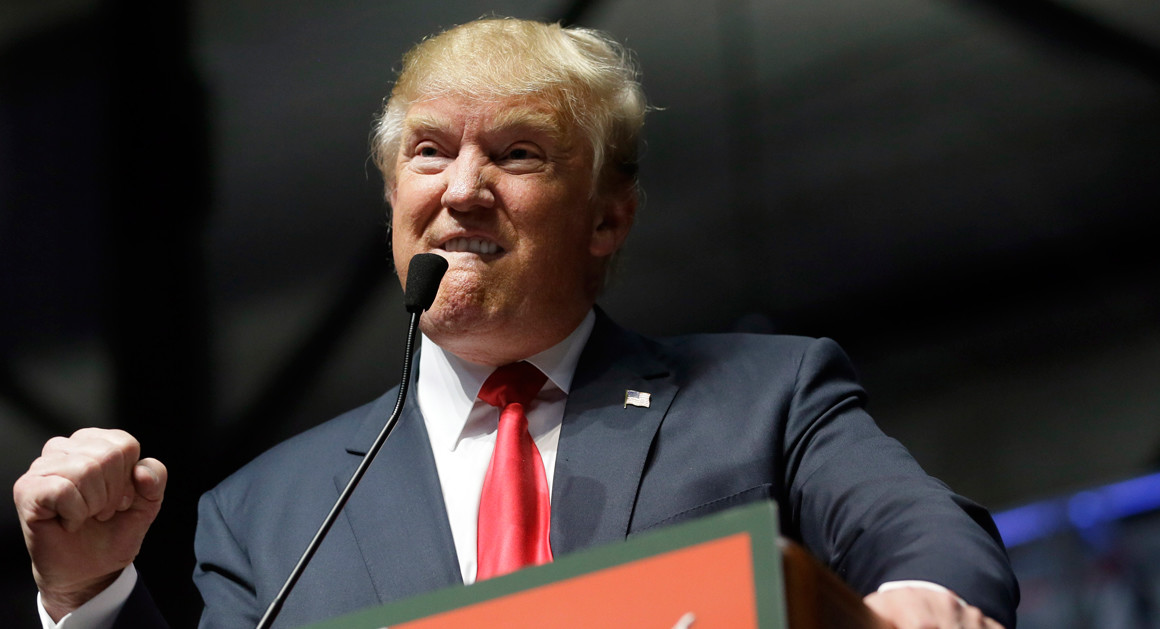
We’ve grown accustomed to Donald Trump’s “no filter” approach to political oratory, but his latest vulgarity was remarkable even by Trumpian standards.
Speaking in Grand Rapids, Michigan, on Monday, Trump assailed Hillary Clinton for losing the Democratic nomination to Barack Obama in 2008. “She was favored to win and she got schlonged,” he said.
To describe Clinton’s loss to Obama in the primaries, Trump chose a slangy verb derived from “schlong,” a Yiddish word for “penis,” in turn from German “schlange,” meaning “snake.” It’s a word that he seems to enjoy, as he used it in a 2011 interview to describe another electoral defeat. When Jane Corwin, the Republican candidate for a House seat in New York, lost to Kathy Hochul in a special election, that, too, was “getting schlonged” in Trump-speak.
Slang dictionaries only record “schlong” as a noun, not a verb, so is “getting schlonged” simply a peculiarity of Trump’s loose-lipped lexicon? Harvard University cognitive scientist Steven Pinker suggested as much in an interview with the Washington Post, surmising that “schlong” as a verb was a misappropriation of Yiddish: Trump may have “reached for what he thought was a Yinglish word for ‘beat’ and inadvertently coined an obscene one,” Pinker said.
While the expression is rare, it has in fact shown up in earlier political contexts, typically from New Yorkers like Trump. The Post notes that Neal Conan, host of NPR’s Talk of the Nation, said in a 2011 broadcast that the 1984 Democratic ticket of Walter Mondale and Geraldine Ferraro “went on to get schlonged at the polls.” And on Fox News in 2006, Dick Morris warned that President George W. Bush was “going to get schlonged” in the midterm elections.
Long before that, the phrase made an appearance in New York City collegiate politics. The Daily Mail uncovered a 1967 article in the student newspaper of the City College of New York in which Ellen Turkish, a candidate on the losing slate for student council, said, “We got schlonged.” (As Ellen T. Comisso, she would go on to a distinguished career as a political scientist.)
Despite these scattered precedents, Trump’s usage rightly raised eyebrows for its leering undertones, given his track record of misogynistic comments. And his reliance on a Yiddish obscenity recalled other questionable moments of political rhetoric.
The most obvious echo is the moment in 1998 when Alfonse D’Amato, then the incumbent U.S. senator from New York, referred to his Democratic rival Chuck Schumer as a “putzhead” in a private breakfast with Jewish Republicans. “Putz,” like “schlong,” is a Yiddishism for “penis.” D’Amato’s supporters downplayed the epithet, with Jackie Mason and Raoul L. Felder writing in the New York Post that Schumer should instead have been called a “schmuck,” yet another phallic vulgarism from Yiddish. (Like “schlong,” “schmuck” has serpentine origins, likely from an Old Polish word meaning “grass snake.”) But D’Amato’s handling of the “putzhead” controversy did him no favors, and Schumer went on to victory in the general election.
While Yiddish has been a fertile source for political slurs, at least among New Yorkers most familiar with the language’s most pungent words, American politicans have made use of wide range of vulgarities to describe their opponents. The standard of vulgarity has shifted over time, however. There was a time when calling someone a “son of a bitch” — or even the euphemistic abbreviation “SOB” — was the harshest of political insults. In Safire’s Political Dictionary, William Safire recounted “SOB” usage in politics back to Franklin D. Roosevelt and concluded, “it is politically acceptable when used by anyone in private conversation; it is considered tasteless when used by public officials in public; and it shocks when used publicly by a president.”
Pesky reporters have often been on the receiving end of politicians’ obscenities. New York Times reporter Adam Clymer famously got called out by George W. Bush in 2000, when a live microphone picked up Bush telling his running mate Dick Cheney that Clymer was “a major-league asshole.” And in 2008, the previous time that Hillary Clinton ran for president, Bill Clinton lashed out at Todd Purdum, who had written about the Clintons for Vanity Fair, calling him “a real slimy guy” and “a scumbag.” (Some newspapers, like the New York Times, decline to print the word “scumbag,” because it originated as a vulgar term for “condom.”)
Will Trump suffer any long-term political fallout over “schlong-gate”? His polling numbers do not seem affected even by his most outrageous statements, so his latest choice of words likely won’t matter, at least in the short term. But over time, his vulgarisms may paint him as rhetorically unpresidential, and he could be the one getting schlonged in the polls.
- Publish my comments...
- 0 Comments
